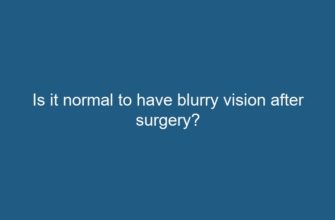The auditory nerve, also known as the cochlear nerve, plays a crucial role in transmitting sound signals from the inner ear to the brain. When this nerve gets damaged, it can result in hearing loss or other auditory impairments. In this article, we will explore various treatment options available for repairing and managing damage to the auditory nerve.
- 1. Understanding Auditory Nerve Damage
- 2. Diagnosis of Auditory Nerve Damage
- What happens when the vestibulocochlear nerve is damaged? – Human Anatomy | Kenhub
- 3. Non-surgical Treatments
- Hearing Aids
- Cochlear Implants
- Vestibular Rehabilitation
- 4. Surgical Interventions
- Microsurgery
- Nerve Grafting
- Tumor Removal
- 5. Rehabilitation and Supportive Therapies
- Auditory Training
- Speech Therapy
- Counseling and Psychological Support
- 6. Experimental Treatments and Research
- Nerve Regeneration Therapies
- Bionic Ear Technology
- 7. Frequently Asked Questions (FAQs)
- FAQ 1: Can auditory nerve damage be cured?
- FAQ 2: Can auditory nerve damage cause total deafness?
- FAQ 3: Is auditory nerve damage permanent?
- FAQ 4: Can auditory nerve damage be prevented?
- FAQ 5: Can auditory nerve damage affect balance?
- FAQ 6: Are there any medications to treat auditory nerve damage?
- FAQ 7: How long does it take to recover from auditory nerve surgery?
- Conclusion
1. Understanding Auditory Nerve Damage
The auditory nerve can be damaged due to several factors, including:
- Exposure to loud noises
- Head trauma
- Infections
- Tumors
- Nerve disorders
It is important to identify the underlying cause of the damage as it may affect the choice of treatment and prognosis.
2. Diagnosis of Auditory Nerve Damage
Diagnosing auditory nerve damage involves a comprehensive evaluation by an audiologist or an otolaryngologist. The following tests may be conducted:
- Audiometry: Measures the ability to hear different frequencies and volumes.
- Imaging tests: Such as MRI or CT scan, to identify any structural abnormalities or tumors.
- Electrocochleography (ECochG): Measures electrical responses to sound stimuli.
- Otoacoustic emissions (OAEs): Determines the functioning of the outer hair cells in the inner ear.
What happens when the vestibulocochlear nerve is damaged? – Human Anatomy | Kenhub
3. Non-surgical Treatments
If the auditory nerve damage is mild or caused by temporary factors, non-surgical treatments may be effective. These include:
Hearing Aids
Hearing aids are devices designed to amplify sounds and improve hearing. They can be beneficial for individuals with mild to moderate hearing loss due to auditory nerve damage. Hearing aids work by collecting sounds through a microphone and delivering them to the ear through a speaker.
Cochlear Implants
Cochlear implants are electronic devices surgically implanted into the inner ear. They bypass the damaged auditory nerve and directly stimulate the auditory nerve fibers, allowing individuals with severe to profound hearing loss to perceive sound. Cochlear implants consist of an external speech processor and an internal electrode array.
Vestibular Rehabilitation
Damage to the auditory nerve can sometimes result in vestibular dysfunction, causing balance problems and dizziness. Vestibular rehabilitation, a form of physical therapy, can help alleviate these symptoms by retraining the brain to adjust to the altered signals from the inner ear.
4. Surgical Interventions
In some cases, surgical interventions may be necessary to repair or manage the damage to the auditory nerve. These options include:
Microsurgery
Microsurgery techniques can be employed to repair or reconstruct the damaged auditory nerve. This procedure involves delicate surgical maneuvers under a microscope to optimize nerve function and restore hearing.
Nerve Grafting
If the auditory nerve is severely damaged or severed, nerve grafting may be considered. This procedure involves taking a nerve from another part of the body and using it to bridge the gap in the damaged auditory nerve. It promotes nerve regeneration and can potentially restore hearing.
Tumor Removal
If the auditory nerve damage is caused by a tumor, surgical removal of the tumor may be necessary. The procedure aims to eliminate the source of compression or trauma to the auditory nerve and prevent further damage.
5. Rehabilitation and Supportive Therapies
Even after undergoing surgical or non-surgical treatments, rehabilitation and supportive therapies are essential to optimize the outcomes of auditory nerve damage. These may include:
Auditory Training
Auditory training programs can help individuals with auditory nerve damage improve their ability to understand and interpret sounds. These programs involve exercises to enhance speech recognition, sound localization, and auditory processing skills.
Speech Therapy
Speech therapy can be beneficial for individuals who experience speech difficulties due to auditory nerve damage. It focuses on improving speech production, articulation, and language skills.
Counseling and Psychological Support
Dealing with auditory nerve damage can be emotionally challenging. Counseling and psychological support can provide individuals and their families with coping strategies and emotional guidance throughout the treatment and rehabilitation process.
6. Experimental Treatments and Research
Medical science is continuously evolving, and researchers are exploring innovative treatments for auditory nerve damage. Some experimental treatments being investigated include:
Nerve Regeneration Therapies
Researchers are exploring various techniques to stimulate nerve regeneration and regrowth in the damaged auditory nerve. These therapies involve the use of growth factors, stem cells, and gene therapy to promote nerve repair.
Bionic Ear Technology
Advancements in bionic ear technology aim to develop devices that can directly stimulate the auditory nerve fibers, bypassing the need for intact hair cells. These futuristic devices hold promise for individuals with severe auditory nerve damage.
7. Frequently Asked Questions (FAQs)
FAQ 1: Can auditory nerve damage be cured?
While complete recovery from auditory nerve damage may not always be possible, various treatments can help manage the condition and improve hearing abilities.
FAQ 2: Can auditory nerve damage cause total deafness?
Auditory nerve damage can lead to partial or complete hearing loss, depending on the severity and extent of the damage.
FAQ 3: Is auditory nerve damage permanent?
Some cases of auditory nerve damage may be permanent, especially if the nerve fibers are extensively damaged or severed. However, advancements in medical treatments offer hope for future interventions.
FAQ 4: Can auditory nerve damage be prevented?
Avoiding exposure to loud noises, wearing protective gear in noisy environments, and seeking prompt medical attention for ear infections or injuries can help reduce the risk of auditory nerve damage.
FAQ 5: Can auditory nerve damage affect balance?
Yes, auditory nerve damage can lead to balance problems and dizziness due to associated vestibular dysfunction.
FAQ 6: Are there any medications to treat auditory nerve damage?
Currently, there are no specific medications available to directly treat auditory nerve damage. However, medications may be prescribed for managing associated symptoms or underlying conditions.
FAQ 7: How long does it take to recover from auditory nerve surgery?
The recovery period after auditory nerve surgery varies depending on the individual, the extent of the surgery, and other factors. It may take weeks to months to fully recover, and rehabilitation may be required to regain optimal hearing abilities.
Conclusion
Damage to the auditory nerve can significantly impact an individual’s hearing abilities and overall quality of life. Early diagnosis, appropriate treatment, and ongoing rehabilitation are key to managing auditory nerve damage. While complete recovery may not always be possible, advancements in medical interventions and ongoing research provide hope for improving outcomes and developing new treatment options in the future.










